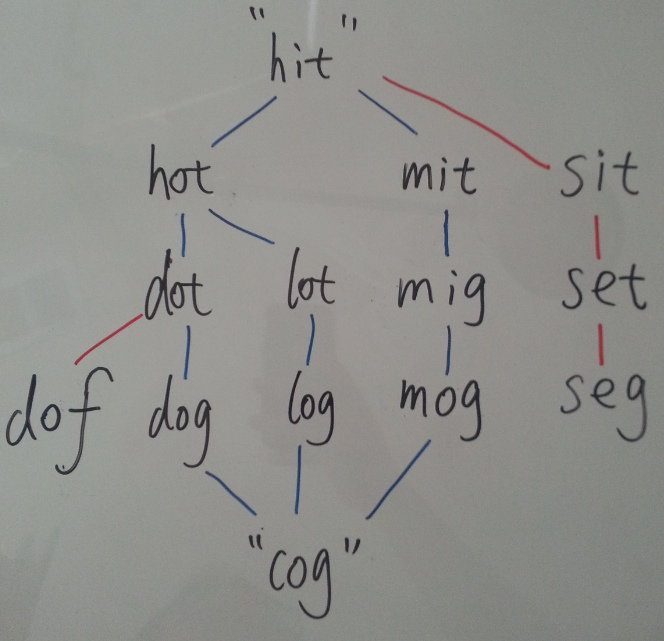LeetCode Question -- Word Ladder II
题目来源: LeetCode OJ, Word Ladder II
思路简介: 先用BFS找出最短路径,在Word Ladder I的基础上修改,使BFS遍历到的word按遍历先后层级排列;然后用DFS找出所有可能的最短路径。
Question:
Given two words (start and end), and a dictionary, find all shortest transformation sequence(s) from start to end, such that:
- Only one letter can be changed at a time
- Each intermediate word must exist in the dictionary
For example,
Given:
start ="hit"
end ="cog"
dict =["hot","dot","dog","lot","log"]
Return
[ ["hit","hot","dot","dog","cog"], ["hit","hot","lot","log","cog"] ]Note:
- All words have the same length.
- All words contain only lowercase alphabetic characters.
Analysis:
这个问题从Word Ladder I的基础上演变而来。Word Ladder I相对简单,只需求出两个单词间的最短路径即可。普遍的做法使用BFS。而这个问题则要求__所有可能的最短路径__。
II的解法也有很多种,但是却不容易[AC]通过,主要原因是时间复杂度太大:
造成时间复杂度过大的可能有两个原因:
原因1. 在字典很大的情况下,Word Ladder I也有相同原因,即与其遍历整个Set<String> dicts,不如在当前word string的基础上把每个char分别尝试替换为[a-z],总共遍历长度是word.length() * 26;可能远远小于遍历整个字典所需要的时间。
(题外话:我称这种为小学生思路,因为我觉得如果让一个小学生来做这类题目,他们可能往往想到的就是这种最朴素的解决办法。而由于大部分程序员的思路会受到刷题训练的限制,往往想到iteration就是用while或者for loop来遍历,而忽略了看似简单幼稚,实则可能更实用的解法)
原因2. 第二个超时原因就在于具体如何找出__所有的__最短路径的方法上了;
原因3. 在以上两个解决的前提下,可能还需要用到DP Cache来保存结果避免重复计算。
我的想法是这样的:
(1) 在__原因1.__解决的前提下,既然用BFS去寻找第一条最短路径是肯定不会超时的,那么如果我用一个时间复杂度不大于BFS的算法去找出所有路径,也不会超时;
(2) 我先想到了DFS,但是还不知道如何应用DFS去解决。我先在纸上画出了BFS的队列模型,试着找出线索。
看一个稍微复杂点的例子:
start = hit
end = cog
dict = [hot,dot,dog,lot,log,dof,mit,sit,set,mog,mig,seg,nax,max]
</p>
Return
[["hit","hot","dot","dog","cog"], ["hit","hot","lot","log","cog"], ["hit","mit","mig","mog","cog"]]

蓝色的线表示valid(可以连通start -> end),红色的线表示invalid。其中,”nax”和”max”这两个单词均未遍历到。
可以发现BFS遍历到的word是有层级先后顺序的:
level 1: [hit]
level 2: [mit, sit, hot]
level 3: [mig, set, dot, lot]
level 4: [mog, seg, dof, dog, log]
level 5: [cog]
在建立了这个样个BFS层级结构的基础上,不难想到最短路径就是在每一层level中选一个word组成的。这里就可以用DFS来解决了。
到这里初步的想法成型了,还有两个需要想清楚的问题:
(1) 字典中其他尚未遍历到的单词,比如”nax”和”max”,如何处理,是否可以被忽略? 必要性
是。这些单词有两种情况,”nax”和”max”是属于同一种情况,他们不参与任何形成start -> end的路径;还有一种情况,比如加入一个单词”sog”,那么便有一条长度为6的路径[hit,sit,set,seg,sog,cog],但是这条路径由于超过了最短路径长度5,所以”sog”可以被忽略。
(2) BFS建立的层级结构,它包含了所有可能构成最短路径的word吗? 充分性
能。但是需要在Word Ladder I的基础上修改,防止一找到路径就结束程序。而是要继续找出同一层级中的其他word,倒数第二层(end 前一层)上的word都有可能是构成最短路径的最后一步。
Code:
程序有点长,分为4个方法
两个辅助方法:
String changeChar(String s, int i, char c)替换String s中位置为i的char为c;boolean canTransform(String s1, String s2)String s1是否可以更改一个char变为s2。
两个主要方法:
List<List<String>> findLadders(String start, String end, Set<String> dict)主函数,包含BFS建立层级结构的实现,和调用DFS返回结果;-
List<List<String>> dfsPathDP(List<List<String>> levels, int level, String start, String end, HashMap<String,List<List<String>>> cache)DFS遍历:List<List<String>> levels是BFS建立的层级结构,int level是当前层级数,String start是上一层level所选择的word,String end是最短路径终止word,HashMap用来做DP Cache。class WordLadderII_Refact { static List<List<String>> findLadders(String start, String end, Set<String> dict) { List<List<String>> res = new ArrayList<List<String>>(); if (canTransform(start, end)) { List<String> path = new ArrayList<String>(); path.add(start); path.add(end); res.add(path); return res; } List<String> bfs = new ArrayList<String>(); int level = 1; int begin = 0; /* a HashMap could be both 1) track explored and 2) length calculate * but we alread have `Set<String> dict` to track the explored */ HashMap<String, Integer> explored = new HashMap<String, Integer>(); bfs.add(start); explored.put(start, 0); dict.remove(start); dict.remove(end); List<List<String>> levels = new ArrayList<List<String>>(); int minLength = -1; outer: while (begin < bfs.size()) { if (minLength >= 0) { //!!! break; } int tail = bfs.size(); // add new level list if (levels.size() == level - 1) { levels.add(new ArrayList<String>()); } for (int i = begin; i < tail; i++) { String curr = bfs.get(i); // get(i) for (int j = 0; j < curr.length(); j++) { for (char c = 'a'; c <= 'z'; c++) { String s = changeChar(curr, j, c); //!!! dict Set MAY NOT include "start & end" if(s.equals(end)) { //!!! FOUND min path explored.put(end, level); minLength = level + 1; levels.get(level-1).add(end); break outer; } if (dict.contains(s) && !explored.containsKey(s)) { explored.put(s, level); dict.remove(s); bfs.add(s); // add s into its level levels.get(level-1).add(s); } } // end of inner for } } // end of outer for each level level++; begin = tail; } // end of while if (minLength == -1) { return res; } /* DFS DP */ HashMap<String, List<List<String>> > cache = new HashMap<String, List<List<String>> >(); return dfsPathDP(levels, 0, start, end, cache); } static List<List<String>> dfsPathDP(List<List<String>> levels, int level, String start, String end, HashMap<String,List<List<String>>> cache) { if (cache.containsKey(start)) { return cache.get(start); } if (level == levels.size()) { if (start.equals(end)) { List<String> pathEnd = new ArrayList<String>(); pathEnd.add(end); List<List<String>> endRes = new ArrayList<List<String>>(); endRes.add(pathEnd); cache.put(start, endRes); return cache.get(start); } else { return null; } } List<List<String>> res = new ArrayList<List<String>>(); List<String> currLevel = levels.get(level); for (String s : currLevel) { if (!canTransform(start, s)) { continue; } List<List<String>> tailingRes = dfsPathDP(levels, level + 1, s, end, cache); if (tailingRes == null) { //!!! continue; } for (List<String> path : tailingRes) { List<String> newPath = new ArrayList<String>(); newPath.add(start); newPath.addAll(path); res.add(newPath); } } // end outer for cache.put(start, res); return res; } static String changeChar(String s, int i, char c) { StringBuilder sb = new StringBuilder(s); sb.setCharAt(i, c); return sb.toString(); } static boolean canTransform(String s1, String s2) { /* a very simple version cause string is determined in length */ int diff = 0; for (int i = 0; i < s1.length(); i++) { if (s1.charAt(i) != s2.charAt(i)) { if (diff == 0) { diff++;; } else { return false; } } } return true; } public static void main(String[] args) { String start = "hit"; String end = "cog"; Set<String> dict = new HashSet<String>(); String[] dictArray = new String[]{"hot","dot","dog","lot","log","dof","mit","sit","set","mog","mig","seg"}; for (String s : dictArray) { dict.add(s); } List<List<String>> res = findLadders(start, end, dict); System.out.println(res.size()); for (List<String> path : res) { System.out.println(path); } } }
以上就是我的代码,我觉得我的代码在coding上和思路上都还有优化的余地。
Coding上的优化可以是在BFS建层级结构那段,我用了比较不常用的outer loop标记;
思路上可以优化的部分是DFS,我在遍历DFS时,实际重复计算了boolean canTransform(String s1, String s2)。
这题还要注意一些edge cases,比如:start wrod 和 end word 可能在Set<String> dict中,也可能不在dict中。
 Category:
Category: 